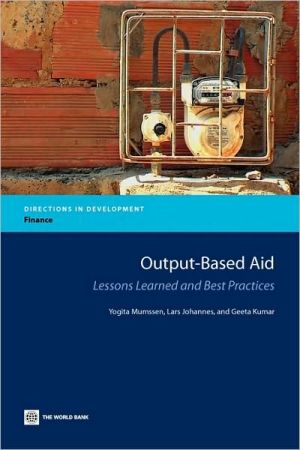Output-Based Aid: A Compilation of Lessions Learned and Best Practice Guidance
Developing country governments and the development aid community are acutely aware of the need to find more effective ways to improve basic living conditions for the poor, as traditional approaches of delivering public support have not always led to the results intended. "Results-based financing"(RBF) instruments, which tie the disbursement of public funding to the achievement of pre-agreed results, are now recognized as one important piece of the aid delivery puzzle. The aim of these...
Search in google:
Developing country governments and the development aid community are acutely aware of the need to find more effective ways to improve basic living conditions for the poor, as traditional approaches of delivering public support have not always led to the results intended. 'Results-based financing' (RBF) instruments, which tie the disbursement of public funding to the achievement of pre-agreed results, are now recognized as one important piece of the aid delivery puzzle. The aim of these instruments is to enhance the effectiveness of public funding. It provides a practical understanding of the experience with output-based aid (OBA), a results-based instrument that is being used to deliver basic infrastructure and social services to the poor, including through public-private partnerships. OBA has been used in the World Bank Group since 2002, including more recently through the Global Partnership on Output-Based Aid which has a mandate to design and test OBA approaches. The authors analyze nearly 200 OBA projects in water and sanitation, energy, health, roads, telecommunications, and education. The piloting phase of OBA has in general been a success and OBA has demonstrated clear advantages over traditional approaches in terms of efficiently targeting subsidies and mobilizing the private sector to serve poor households that would otherwise go without an improved service. OBA has also demonstrated that monitoring for results is possible - if appropriate systems are put in place. As the first comprehensive review of OBA in eight years, it will be an essential reference for infrastructure and social services sector experts and OBA practitioners around the world.
Foreword xiAcknowledgments xiiiAbbreviations xvPart I Introduction to Output-Based Aid 1Chapter 1 Output-Based Aid: Improving Access to Basic Services for the Poor 3Defining Output-Based Aid 4This Book: Analyzing the Performance of OBA 7Notes 11Chapter 2 Snapshot of the OBA Universe 13Preliminary Evidence on the Effectiveness of OBA 15Where Does the Funding Come From? 16Variations to OBA Applications 18Notes 22Part II OBA Review by Sector 23Chapter 3 Information and Communication Technology 25Funding 28Targeting 30Performance Risk 31Private Sector Capital and Expertise 33Monitoring 34Notes 35Chapter 4 Roads 37Funding 43Targeting 44Performance Risk 44Private Sector Capital and Expertise 47Monitoring 48Notes 49Chapter 5 Energy 51Off-Grid Systems 53Minigrid Systems 56Grid-Based Systems 56Funding 57Targeting 58Performance Risk 60Private Sector Capital and Expertise 63Monitoring 64Note 66Chapter 6 Water and Sanitation 67Funding 68Targeting 69Performance Risk 71Private Sector Capital and Expertise 74Monitoring 75Note 77Chapter 7 Health 79Funding 84Targeting 85Performance Risk 86Private Sector Capital and Expertise 88Monitoring 88Notes 90Chapter 8 Education 91Funding 92Targeting 92Performance Risk 94Private Sector Capital and Expertise 94Monitoring 96Note 96Part III Cross-Cutting Lessons 97Chapter 9 Cross-Cutting Lessons Learned: Challenges and Best Practice 99Transparency: Explicit Targeting of Subsidies for the Poor 101Accountability: Shifting Performance Risk to Providers 107Private Sector Capital and Expertise 117Innovation and Efficiency 120Sustainability, Tariffs, and the Enabling Environment 125Monitoring of Results in Traditional World Bank Projects 130Notes 133Chapter 10 Key Considerations for Moving Forward 135Notes 140Appendix Output-Based Aid Projects in the World Bank Group, March 30, 2009 143References 159Index 165Boxes2.1 Applications of OBA Subsidy Design Mechanisms 183.1 Telecommunications Development Fund in Chile 263.2 Fund for Telephony Development in Guatemala 344.1 Argentina: Pilot Roads Maintenance and Sector Rehabilitation Project 41








